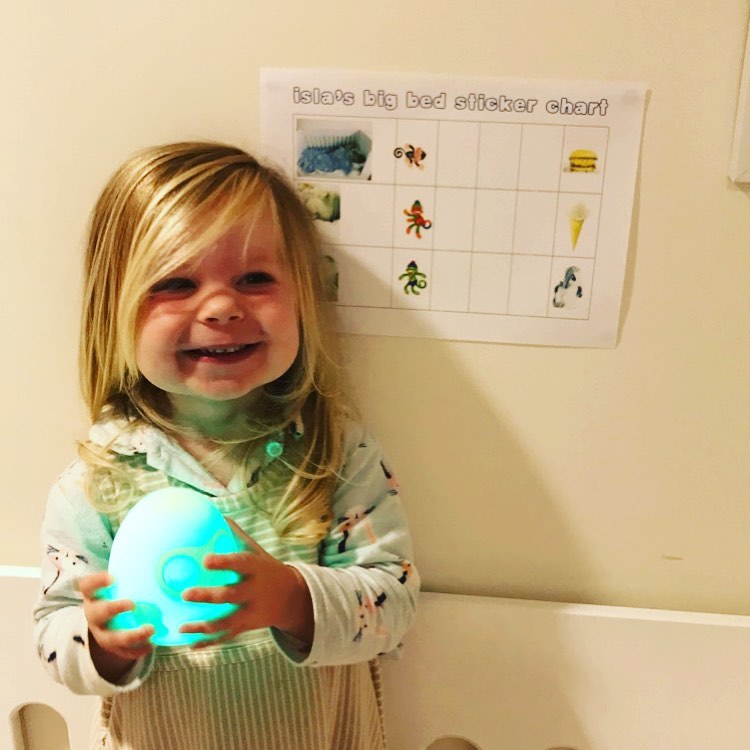It’s already eight in the evening. You gave your 4-year-old daughter a bath, read her favorite story book, kissed her good night, and turned on her nightlight. At nine, you hear her little footsteps upstairs. What? She’s not asleep? Trust me. I know the feeling.
Here’s the probable culprit most parents never think about: blue light. This type of light is emitted by tablets, laptops, smart phones, as well as by many types of artificial lighting, including children’s nightlights. This has a direct impact on your child’s quality and quantity of sleep. Sounds a bit hokey? Let me tell you how and why this is a real thing.
The Effect of Blue Light on Your Child
It is blue light in particular, which has this effect on humans, not all colors. Blue wavelengths have been shown to be super beneficial during daylight hours as they boost attention, reaction times, even improve mood. Unfortunately, this same type of increase in brain activity can be very disruptive at night when you are trying to get your child to sleep. And our exposure to blue light seems to increase every day! There has been a literal explosion of electronic devices with screens, including those energy-efficient lights, which continues to increase our children’s exposure to blue wavelengths, especially after dark. Even many so called ‘white lights’ contain quite a bit of blue light in their spectrum.
According to experts, blue light tells your child’s brain that it is not yet time to sleep. Let’s take a look at why this is.
Sometime in 2002, experts discovered that some sensors in the human eyes are responsible for sending information to the master of the circadian clock in the brain which regulates the wake-sleep pattern. It is these sensors, the ones which tell your body when to sleep, that are the most sensitive to blue light. In short, blue light exposure can affect the proper function of your little one’s natural body clock.
To top it off, it turns out that blue light affects melatonin production in a big way. A Harvard study showed that exposure to blue light can suppress melatonin, the body’s sleep hormone, twice as much as green light. “While light of any kind can suppress the secretion of melatonin, blue light at night does so more powerfully.”
Just how harmful is exposure to blue light at night?
- It sends a signal to the brain to turn off the production of melatonin, thereby keeping your little one awake.
- It influences the circadian rhythm, or 24-hour body clock. This means your child might be awake until the wee hours in the morning and then be sleepy during the day. Instead of sleeping on time, exposure to blue light will alter your child’s internal clock instead of aligning it with the environment.
- Many studies have shown that sleep deprivation may be a contributing cause in the development of serious diseases such as cancer, diabetes, heart disease, and obesity.
In other words, exposure to blue light electronic devices and artificial lighting affects your child’s ability to synchronize her sleep and wake up schedule with the rise and fall of the sun.
Tips to Reduce Blue Light Before Bedtime and at Nighttime
Exposure to blue wavelengths at night could ruin your child’s chances of getting that much needed rest. The good news is that you can do something to minimize their exposure.
Check out these certified tips to make sure your child is getting enough shuteye.
- Exchange blue lights with something red or orange. “Use dim red lights for night lights. Red light has the least power to shift circadian rhythm and suppress melatonin.” Harvard Medical School.
- Avoid exposing your child to tablets or televisions approximately two to three hours before bedtime.
- Minimize your child’s nightlight brightness. And beware of nightlights emitting blue or white light!
- Keep your child out of the brightest lights in the house. The further away from your child, the better. If you can’t do this, turn those lights down or off at least 30 minutes before bedtime. The amount of light that reaches your child’s eyes could have an impact on her ability to sleep early.
- Encourage playtime and lots of bright light during the day. This increases your child’s alertness and mood at daytime and makes it easier for her to sleep at night.
In a nutshell, take it easy on iPads and those “Frozen” DVDs. Limit your child’s screen time and encourage playtime. These are simple yet effective ways to help you stay fit as well.
###
Ooly – More sleep for the whole family.
Put an end to your child’s bedtime battles, nighttime awakenings, and early morning wake-ups.
Visit our website
www.novo123.com/ooly
###






